Gabriel Pereira de Castro (1571-1632) was a Portuguese priest, lawyer and poet.
Contents

Gabriel Pereira de Castro (1571-1632) was a Portuguese priest, lawyer and poet.

Gabriel Pereira de Castro was born in Braga on 7 February 1571. He became a priest there. Then he studied law at the University of Coimbra. [1] Later he was a professor there. [2] He died on 18 October 1632 in Lisbon.
Gabriel Pereira de Castro wrote some books about law. He is however known chiefly for his epic poem Ulisseia ou Lisboa Edificada (Ulisseia or Lisbon Built). It consists of ten books and is written in ottava rima. [3] Its form is typical for Renaissance epic poems. The poem imitates The Lusiads by Luís Vaz de Camões. It is about the founding of the town of Lisbon by Ulysses (Odysseus). [4] The book was published posthumously by poet's brother Luís Pereira de Castro in 1636. [1] He wrote poems in Latin and Spanish, too. [1] Ulisseia is considered to be one of the most significant Portuguese epic after Camões. [5]

Fernando António Nogueira Pessoa was a Portuguese poet, writer, literary critic, translator, publisher, and philosopher, described as one of the most significant literary figures of the 20th century and one of the greatest poets in the Portuguese language. He also wrote in and translated from English and French.

Luís Vaz de Camões, sometimes rendered in English as Camoens or Camoëns, is considered Portugal's and the Portuguese language's greatest poet. His mastery of verse has been compared to that of Shakespeare, Milton, Vondel, Homer, Virgil and Dante. He wrote a considerable amount of lyrical poetry and drama but is best remembered for his epic work Os Lusíadas. His collection of poetry The Parnasum of Luís de Camões was lost during his life. The influence of his masterpiece Os Lusíadas is so profound that Portuguese is sometimes called the "language of Camões".
Ottava rima is a rhyming stanza form of Italian origin. Originally used for long poems on heroic themes, it later came to be popular in the writing of mock-heroic works. Its earliest known use is in the writings of Giovanni Boccaccio.

Sebastian was King of Portugal from 11 June 1557 to 4 August 1578 and the penultimate Portuguese monarch of the House of Aviz.
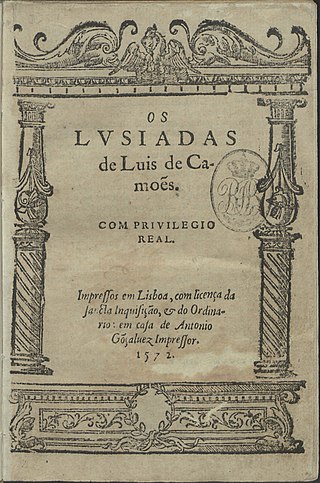
Os Lusíadas, usually translated as The Lusiads, is a Portuguese epic poem written by Luís Vaz de Camões and first published in 1572. It is widely regarded as the most important work of Portuguese-language literature and is frequently compared to Virgil's Aeneid. The work celebrates the discovery of a sea route to India by the Portuguese explorer Vasco da Gama (1469–1524). The ten cantos of the poem are in ottava rima and total 1,102 stanzas.

Portuguese literature is literature written in the Portuguese language. In its strictest sense it is literature written particularly by citizens of Portugal; more generally it may also refer to Lusophone literature written by authors from Brazil, Angola, Mozambique, and other Portuguese-speaking countries and territories. This article focuses on Portuguese literature sensu stricto, that is, literature from the country of Portugal.

Eugénio de Paula Tavares was a Cape Verdean poet. He is known through his famous poems (mornas), mostly written in the Creole of Brava.
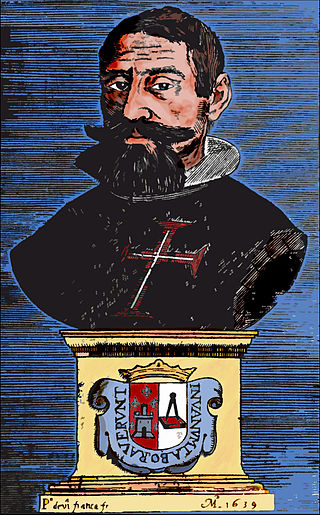
Manuel de Faria e Sousa was a Portuguese historian and poet. He frequently wrote in Spanish.

António Ferreira was a Portuguese poet and the foremost representative of the classical school, founded by Francisco de Sá de Miranda. His most considerable work, Castro, is the first tragedy in Portuguese, and the second in modern European literature.
Cesário Verde was a 19th-century Portuguese poet. His work, while mostly ignored during his lifetime and not well known outside of the country's borders even today, is generally considered to be amongst the most important in Portuguese poetry and is widely taught in schools. This is partly due to his being championed by many other authors after his death, notably Fernando Pessoa.

Alexandre Manuel Vahia de Castro O'Neill de Bulhões, GOSE was a Portuguese writer and poet of Irish descent.
Portuguese poetry refers to diverse kinds of poetic writings produced in Portuguese. The article covers historical accounts of poetry from other countries where Portuguese or variations of the language are spoken. The article covers Portuguese poetry produced from the Middle Ages to the present era.
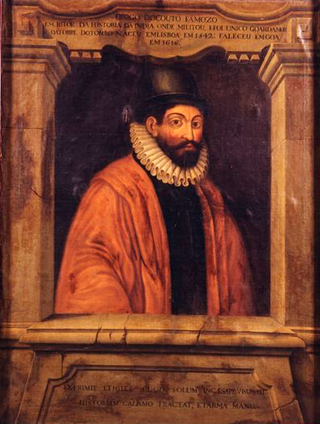
Diogo do Couto was a Portuguese historian.
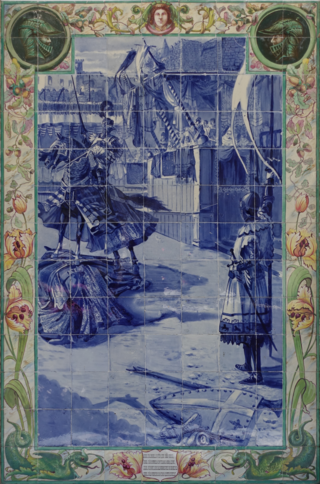
The Twelve of England is a Portuguese chivalric legend of 15th-century origin, famously related by the poet Luís de Camões in his 1572 Os Lusíadas. It tells the story of twelve Portuguese knights who travelled to England at the request of twelve English ladies to avenge their insult by a group of English knights.

Jorge Cândido Alves Rodrigues Telles Grilo Raposo de Abreu de Sena was a Portuguese-born poet, critic, essayist, novelist, dramatist, translator and university professor who spent the latter portion of his life in the United States.

António Maria Lisboa was a Portuguese surrealist poet.

Vasco Mouzinho de Quevedo was a Portuguese poet, appreciated for his epic poems.
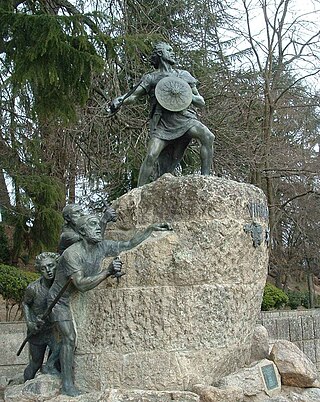
Viriato Trágico is an epic poem by Portuguese author Brás Garcia de Mascarenhas.

The Camões Monument is a monument located in Luís de Camões Square in the Chiado neighbourhood of Lisbon, Portugal. The monument comprises a tall bronze statue of Luís de Camões, the national poet, on a lioz limestone pillar surrounded by eight smaller statues of leading figures of Portuguese culture and literature in the Age of Discoveries: Fernão Lopes, Pedro Nunes, Gomes Eanes de Zurara, João de Barros, Fernão Lopes de Castanheda, Vasco Mouzinho de Quevedo, Jerónimo Corte-Real, and Francisco de Sá de Meneses.
Gabriel Pereira may refer to: